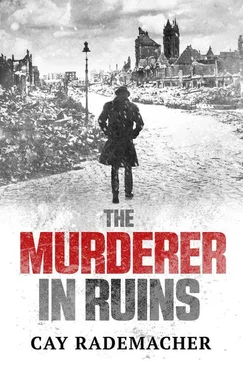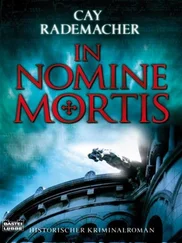Cay Rademacher - The Murderer in Ruins
Здесь есть возможность читать онлайн «Cay Rademacher - The Murderer in Ruins» весь текст электронной книги совершенно бесплатно (целиком полную версию без сокращений). В некоторых случаях можно слушать аудио, скачать через торрент в формате fb2 и присутствует краткое содержание. Год выпуска: 2015, ISBN: 2015, Издательство: Arcadia Books Limited, Жанр: Триллер, на английском языке. Описание произведения, (предисловие) а так же отзывы посетителей доступны на портале библиотеки ЛибКат.
- Название:The Murderer in Ruins
- Автор:
- Издательство:Arcadia Books Limited
- Жанр:
- Год:2015
- ISBN:9781910050750
- Рейтинг книги:5 / 5. Голосов: 1
-
Избранное:Добавить в избранное
- Отзывы:
-
Ваша оценка:
- 100
- 1
- 2
- 3
- 4
- 5
The Murderer in Ruins: краткое содержание, описание и аннотация
Предлагаем к чтению аннотацию, описание, краткое содержание или предисловие (зависит от того, что написал сам автор книги «The Murderer in Ruins»). Если вы не нашли необходимую информацию о книге — напишите в комментариях, мы постараемся отыскать её.
The Murderer in Ruins — читать онлайн бесплатно полную книгу (весь текст) целиком
Ниже представлен текст книги, разбитый по страницам. Система сохранения места последней прочитанной страницы, позволяет с удобством читать онлайн бесплатно книгу «The Murderer in Ruins», без необходимости каждый раз заново искать на чём Вы остановились. Поставьте закладку, и сможете в любой момент перейти на страницу, на которой закончили чтение.
Интервал:
Закладка:
It was an old Gestapo trick. Maybe she had just been tired. Or so upset by being arrested that she hadn’t been paying attention. But it was also possible that she had told a lie first time and could no longer remember exactly what she had said.
‘Next!’ he called to the uniformed policeman outside.
Two hours later it was finally all over. His back aching, the chief inspector got up from his chair and walked up and down in his office to get the circulation in his injured leg going. Eventually he had worked off the worst of his limp. Then he called in the other officers. The Department S chief looked as fit and fresh as if he had had a good ten hours’ sleep. According to him the raid had revealed a tank of schnapps and half a tonne of penicillin. Also the CID search guy was pleased: they had caught a major racketeer.
Maschke and the rest, however, looked tired and unhappy. The only one who still seemed optimistic was MacDonald, and he hadn’t taken part in the raid or sat in on any of the interrogations.
Why didn’t he just go home hours ago, Stave wondered. ‘Thanks to you all, gentlemen,’ he said, and got to his feet.
Not one of the items they had confiscated, not one thing any of those arrested had said, had been of the slightest help to the murder investigation. Nothing, zero, zilch! What might we have simply missed, the chief inspector asked himself. He waited until they had all left, then sat back down at his desk and began once more going through his notes and the interrogation reports, one by one, for nearly another hour. If it had been summer at least it would have been light by now, he thought. His eyes hurt. Nothing, except for the one potentially important, but also potentially laughable, contradiction in the statements by Anna von Veckinhausen.
Stave wondered if he should just put his head down on his desk for an hour or two. But when he considered the possibility that he might fall into a deep sleep and his colleagues, fresh from a night’s sleep, would find him curled up in a ball on the floor, he decided it was better to go home. He made his way slowly to the main entrance. Then stopped dead.
A shadow.
Stave held his breath and gazed at a massive column in the outer hallway. There was a man crouched down on the other side of it. All Stave could see at first was a leg and a shoulder. He kept still. The unknown figure gradually got to its feet, obviously not having noticed him. Maybe it was just a drunk, sleeping it off accidentally right in front of the CID building. The man staggered a step or two away from the column and walked out on to the square, yellow moonlight falling on his face.
Stave recognised him as one of the young men they had arrested a few hours earlier. He wondered who had interrogated him and let him go. Then he realised something else: the man was not drunk; he had been beaten up. His eye was swollen, his lip cut open, and he was walking with the crippled gait of someone who had been beaten and kicked in the stomach and lower body. A vile thought immediately came to mind: Gestapo. The man had been beaten up during his interrogation. Then he was released purely so that no other officer or British summary court judge would see his injuries. But he had been hurt so badly that he could hardly make it out of the building. It was only now that he had gathered strength enough to stagger away.
Stave followed him, as discreetly as he could.
The unknown man staggered down Holstenwall, then turned right at Millerntor, finally getting as far as the warren of tiny streets north of the Reeperbahn, to a half-destroyed rental block, with bits of cardboard next to the doorbells giving the names and birth dates of recently moved-in homeless. The man stopped, still bent over, then leaned down and scraped a handful of snow together to wipe his face. Trying to make himself presentable before his mother sees him, Stave thought to himself. The young man fumbled in the pocket of an overcoat that was way too big for him, his hands numb with cold and possibly also with bruises. When eventually he managed to find the key, Stave quickly approached him.
‘CID,’ he said in a low voice. No need to wake the neighbours.
The man turned round, an expression of horror on his face. ‘What do you want now?’
He was barely 20 years old, Stave reckoned. Undernourished. Perhaps this was the first time in his life he had been badly beaten. On the other hand: who knew what he might have done in the war?
‘Who did this to you?’ Stave asked, indicating his swollen eyelid. He was too tired to beat about the bush. Also he was counting on the young man being afraid. Ask a simple question and he might get a simple answer.
‘A policeman,’ the lad said. ‘While I was being interrogated.’
Stave closed his eyes and cursed under his breath. ‘Which one?’
‘Inspector Maschke.’
Why am I not surprised? Stave asked himself angrily.
‘Why did he treat you like that?’
The young man stared at him as if he’d asked a stupid question. ‘Maybe your colleague learnt his trade with the Gestapo,’ he said at last.
Stave offered the lad a cigarette. A few more questions and he had got the basic facts. His name was Karl Trotzauer, 19, resident in St Pauli district, unemployed and caught on the black market with a bottle of schnapps and an oil painting of a farmhouse in a gold-painted frame. But you didn’t beat people up for being in possession of a bottle of schnapps and a piece of kitsch. Apparently Maschke had also asked where he had been on the night of the twentieth of January. And Trotzauer, with no idea what he was on about, had told him he had been over at his aunt’s house in Eimsbuttel and had then come home via Lappenbergs Allee.
‘That’s when he started hitting me,’ he said, pointing to his swollen eye. ‘No warning, no shouting, just laying into me with his fists and kicking me. I thought I was going to die.’
‘Then what happened?’
‘When I came to my senses he asked me how I had killed the old man.’
‘The old man?’
‘I had no idea what he was talking about. It was only after he had beaten me some more that I realised he was on about a murder victim. Gradually it dawned on me that he wanted me to confess to killing some old man.’
‘And did you?’
Trotzauer glowered at him. ‘It hurt like hell but I’m not stupid. Obviously I didn’t confess because there was nothing to confess to. I didn’t kill any old man. I told Maschke that, again and again. In between his blows. Eventually he let me go, promising that he would get me in the end.’
‘Off you go,’ Stave said.
On the long way back the chief inspector had plenty of time to reflect. On one occasion he had to stop to show his CID pass to a British patrol. Other than that, he saw nobody. It was as if Hamburg was deserted, the streets ruined and ripped apart, the shops stripped bare, the bombed-out railway stations all abandoned by the inhabitants, all of them gone somewhere else to build a new and better city.
Had Maschke been in the Gestapo? He was supposed to be relatively fresh out of police training college, so he couldn’t have been there since before 1945. Nor could Stave imagine his big, gawky, chain-smoking colleague who still lived with his mother getting up at five in the morning to kick down the door of some Jew or other.
But even if Maschke had been in the Gestapo: why would he want to beat up some low-life black marketeer? Over-enthusiasm? Just because somebody had been in the area around the supposed time of the murder was no reason to beat him up. Why would Maschke want to make a suspect of a 19-year-old on practically no evidence? Why would he want to beat a confession out of him when he almost certainly had nothing to do with the real murderer?
Читать дальшеИнтервал:
Закладка:
Похожие книги на «The Murderer in Ruins»
Представляем Вашему вниманию похожие книги на «The Murderer in Ruins» списком для выбора. Мы отобрали схожую по названию и смыслу литературу в надежде предоставить читателям больше вариантов отыскать новые, интересные, ещё непрочитанные произведения.
Обсуждение, отзывы о книге «The Murderer in Ruins» и просто собственные мнения читателей. Оставьте ваши комментарии, напишите, что Вы думаете о произведении, его смысле или главных героях. Укажите что конкретно понравилось, а что нет, и почему Вы так считаете.











